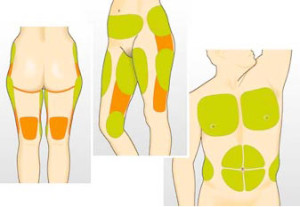What To Eat For Breakfast?
We all know that breakfast is the most important meal of the day, however grabbing a doughnut and coffee is worse than skipping breakfast altogether. Many breakfast foods are high in sugar, carb-filled, or too fatty. These foods such as doughnuts, pastries, cereals, pancakes and coffee can give you an instant boost in energy, but once the body breaks down the food and the energy is quickly used up you feel hungry again. Once the energy is used up from these foods you will become sluggish and groggy. This normally occurs long before lunchtime causing one to seek out quick and easy alternatives that are usually not healthy. If you can’t find a snack you are apt to over indulge at lunchtime.
Not eating breakfast isn’t a better option either. Many people think that skipping breakfast is a great way to cut out calories however skipping breakfast leaves the stomach empty. You have gone all night fasting so your body needs refueling to give you energy in the morning. An empty stomach and low blood sugar can lead to more snacking throughout the morning. Snacks tend to be high in sugar and high in carbohydrates.
A healthy breakfast is essential to get your day started on the right track. Proper food and nutrition are required for the body to function. In the morning the body requires food to refuel and break the fast from when you were sleeping. A good breakfast requires protein and fiber. Protein and fiber are valuable sources of energy and nutrients. The body takes longer to break down protein and fiber satisfying hunger and keeping you feeling fuller longer. This lessens ones need to snack in between breakfast and lunch.
Sources of protein include low fat meat, eggs dairy, and beans. Sources of fiber include whole grains, fruits and vegetables. To get the most out of your breakfast you need to eat the right combination of proteins and fiber. Some proteins have high levels of fat. Eating too much fiber can bind up proteins making it impossible for the body to break it down to use it for energy.
Protein is necessary for almost all bodily functions. In the body they are broken down to amino acids, which manufacture tissue, enzymes, hormones and antibodies. Amino acids also build and repair muscles, and fight infections. Animal products such as fish, milk, eggs and meat are complete proteins with all essential amino acids. Incomplete proteins such as rice, dry beans, nuts and peanut butter don’t have all the essential amino acids and need to be paired with other proteins.
Breakfast foods that contain protein include eggs, cheese, milk, yogurt, bacon, sausage, fish, and turkey. Cheese, milk, bacon, and sausage, all contain high levels of fat so low fat versions and lean cuts should be chosen. Even so they should be consumed in moderation. Low fat proteins are lean meats, poultry, fish, hard-boiled eggs, and peanut butter. Low fat dairy products include skim milk, low fat yogurt, low fat cheese, cottage cheese, and natural cheeses.
Fiber helps in weight management, digestion, and relieves constipation. It fills you up and keeps you fuller longer. The body burns calories to break it down and pass it through the digestive tract. Sources of fiber include whole grain bread, rolls, and bagels, hot or cold whole grain cereal, low fat bran muffins, crackers and Melba toast. Fresh and frozen fruits and vegetables are also a great source of fiber, which are easily digested and provide a load of vitamins, minerals and essential nutrients to the body. Fruits and vegetables can be consumed as a whole, in 100% juice without sugar, or mixed in a smoothie.
A combination of core food groups provides the body with complex carbs, protein, fiber and small amount of fat, all the essential nutrients that the body needs. Eating a good breakfast has volumes of health benefits plus it keeps you feeling full for hours, staving off hunger and the need to snack. For a healthy breakfast choose one or two options for proteins and fibers. Remember skipping breakfast is not an option. If you feel like you don’t have time for breakfast pack your foods to go, prepare your breakfast the night before, or choose a breakfast that is simple and easy to make. Examples include oatmeal with blueberries and almonds, fruit and cheese, cottage cheeses with fruit, yogurt with granola, fresh fruit salad, protein shake or an energy bar. Be creative and switch it up daily so you won’t get bored with your breakfast.
-
The Relationship Between Sleep, Health and Body Weight
Sleep Yourself Thin!There have been various studies examining th
-
Weight Loss Motivation I CAN DO IT
Several months ago I was in desperate need of weight loss motivation.
-
Boot Camp Fitness Program - Designing Workouts for Your Camp
Fitness boot camps are now becoming a tr
-
The Amazing Health Benefits Of Chia Seeds
I am often hesitant about fad supplements, products that become
-
7 Weight Loss Myths & Why Theyre Wrong
-
7 Ways To Get Fit Without Depriving Yourself
When embarking on a weig
- DON'T MISS
- Destiny's Belly
- A Revolutionary Product Called Hoodia Part 2
- No More Diabetes & A New Lease On Life
- How To Select A Weight Loss Program
- Weight Loss Goals and Why They Don’t Work
- Everyday Exercise Schedules: The Confident Tactic to Get Fit
- Lose Weight Without Starvation!
- Do You Know The Whole Story About Hydroxycut Banning?
- The 5 Keys To Finally Lose Fat Fast
- Diverticulitis vs. irritable bowel syndrome: Causes, symptoms, risk factors, and complications




